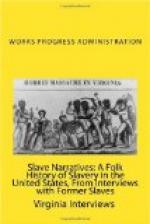Der were 450 acres of de plantation. I can’t remember all de slaves. I know der were 80, odd slaves.
Lots of mornings I would go out hours fore daylight and when it was cold my feet would ’most freeze. They all knew dey had to get up in de mornin’. De slaves all worked hard and late at night.
I heerd some say that the overseer would take dem to de barn. I remember Tom Lewis. Then his massa sold him to our massa he told him not to let the overseer whip him. The overseer said he would whip him. One day Tom did something wrong. The overseer ordered him to de barn. Tom took his shirt off to get ready for de whippin’ and when de overseer raised de whip Tom gave him one lick wid his fist and broke de overseer’s neck.
Den de massa sold Tom to a man by de name of Joseph Fletcher. He stayed with old man Fletcher til he died.
Fore de slaves were sold dey were put in a cell place til next day when dey would be sold. Uncle Marshall and Douglas were sold and I remember dem handcuffed but I never saw dem on de auction block.
I never knew nothin’ bout de Bible til after I was free. I went to school bout three months. I was 19 or 20 years old den.
My uncle Bill heard dey were goin’ to sell him and he run away. He went north and cum back after de surrender. He died in Bluemont, Virginny, bout four years ago.
After de days work dey would have banjo pickin’, singin’ and dancin’. Dey work all day Saturday and Saturday night those dat had wives to see would go to see dem. On Sunday de would sit around.
When Massa was shot my mother and dem was cryin’.
When Slaves were sick one of the mammies would look after dem and dey would call de doctor if she couldn’t fix de sick.
I remember de big battle dey fought for four days on de plantation. That was de battle of Bull Run. I heard shootin’ and saw soldiers shot down. It was one of de worst fights of de war. It was right between Blue Ridge and Bull Run mountain. De smoke from de shootin’ was just like a fog. I saw horses and men runnin’ to de fight and men shot off de horses. I heard de cannon roar and saw de locust tree cut off in de yard. Some of de bullets smashed de house. De apple tree where my massa was shot from was in de orchard not far from de house.
De Union Soldiers won de battle and dey camped right by de house. Dey helped demselves to de chickens and cut their heads off wid their swords. Dey broke into de cellar and took wine and preserves.
After de war I worked in de cornfield. Dey pay my mother for me in food and clothes. But dey paid my mother money for workin’ in de kitchen.
De slaves were awful glad bout de surrender.
De Klu Klux Klan, we called dem de paroles, dey would run de colored people, who were out late, back home. I know no school or church or land for negroes. I married in Farguar [HW: Farquhar] Co., state of Virginny, in de county seat. Dat was in 1883. I was married by a Methodist preacher in Leesburg. I did not get drunk, but had plenty to drink. We had singin’ and music. My sister was a religious woman and would not allow dancin’.




